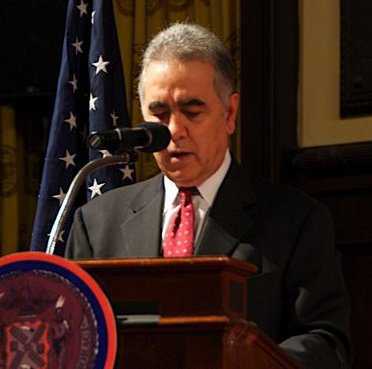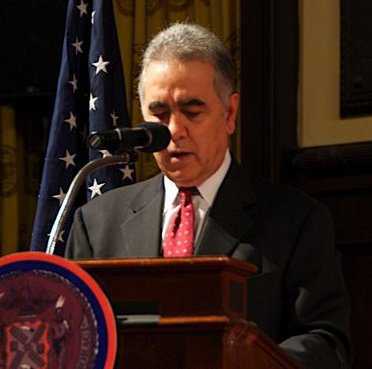By Harut Sassounian
Publisher, The California Courier
At the request of Sen. Barbara Boxer, the Senate Foreign Relations Committee had postponed from early August to mid-September its vote on Matt Bryza, nominee for U.S. Ambassador to Azerbaijan. Senators Boxer, Harry Reid, and Robert Menendez were satisfied neither with Bryza’s answers during the confirmation hearing nor subsequently with his written responses.
While Congress was in recess for the past 40 days, a number of newspapers and websites questioned the appropriateness of Bryza’s nomination to such an important post. They raised several conflict of interest issues regarding Bryza and his Turkish-born wife, Zeyno Baran, who until recently was director of the Center for Eurasian Policy at the Hudson Institute, a Washington think tank.
This article shall focus on a single issue — the allegation that Bryza and Baran had received gifts during their August 23, 2007 wedding in Istanbul. If true, this would not only abort Bryza’s chances of becoming ambassador, but more importantly, it would get him into serious legal trouble. Under U.S. laws, government officials and their spouses are prohibited from receiving gifts, even wedding presents, unless these are given by close acquaintances. Such gifts have to be reported to the U.S. government, and the Internal Revenue Service. Bryza’s case is more complicated. If he got gifts that he did not report, while telling the Senate Foreign Relations Committee under oath that he did not receive such gifts, he could be charged with non-reporting of a gift, tax evasion, and perjury.
Bryza’s celebrity wedding triggered a major controversy when Azeri jouranlist Adil Khalil reported in the opposition newspaper Azadlig that Haydar Babayev, Azerbaijan’s Minister of Economic Development, had paid most of the couple’s wedding expenses. Babayev refuted the accusation and filed a lawsuit for libel, causing Khalil to be arrested, severely beaten, stabbed, and forced to flee to France. The newspaper’s editor, Ganimat Zahid, was also arrested on unsubstantiated charges. Last month, Azadlig suspended publication, after it was evicted from its offices by the authorities. Having exhausted all domestic court appeals, the newspaper’s editor filed a claim against Azerbaijan with the European Court of Human Rights.
According to Azeri and Turkish media reports, around 400 prominent guests from several countries attended Bryza’s 2007 lavish wedding, held under tight security. Among the attendees from Turkey were the Minister of Energy and Natural Resources, the U.S. Consul General in Istanbul, the Armenian Patriarch of Turkey, members of parliament, and major media figures. Bryza also invited Armenian officials to his wedding, including Pres. Robert Kocharian and Foreign Minister Vartan Oskanian, neither of whom attended. At the time, Bryza was Deputy Assistant Secretary of State and U.S. co-chair of the OSCE Minsk Group, the mediators of the Artsakh (Karabagh) conflict.
Several high-ranking Azeri officials also attended Bryza’s wedding in Istanbul: Foreign Minister Elmar Mammadyarov who served as a wedding witness, Minister of Economic Development Haydar Babayev, Azeri National Petroleum Company President Rovnaq Abdullaev, Deputy Speaker of Parliament Valeh Aleskerov, and Azerbaijan’s Consul General in Los Angeles Elin Suleymanov. Pres. Ilham Aliyev’s letter of congratulation was read at the start of the wedding. According to documents obtained by this writer from the European Court of Human Rights, the Azeri editor claimed that Pres. Aliyev sent “a special gift to the bride.”
Even though Bryza and Baran requested that in lieu of gifts guests make a contribution to a Turkish charity, it is common practice in the Middle East to hand gifts — particularly jewelry — to a newlywed couple. For example, Turkey’s Foreign Minister Ahmet Davutoglu, during a meeting with Hillary Clinton in Kabul in July, told her that he would be sending a gift to the Secretary of State, on the occasion of her daughter’s wedding.
According to the Media Rights Institute, Minister Babayev’s lawyers confirmed during a court hearing in Baku that he attended the wedding and “even had a gift” for Bryza. Yet, at his Senate confirmation hearing, Bryza refuted the allegation that an Azeri official had financed his wedding, adding that its entire cost was paid by the couple’s families.
The allegation that Bryza received wedding gifts should be thoroughly investigated before the Senate votes on his nomination. Even though Senators and members of the Armenian, Greek, and Cypriot communities oppose Bryza for multiple reasons, the wedding expenses and gifts are the only issues that could have serious legal ramifications. Therefore, the Senate should wait for the outcome of the lawsuit filed by the Azeri editor in the European Court of Human Rights.
Bryza should fully cooperate with such an investigation in order to clear the clouds of suspicion hanging over his head, before he is rushed to Baku. He should provide the complete list of his wedding guests and disclose all gifts received by the newlyweds and their families.
U.S. investigators should contact everyone who attended Bryza’s wedding to verify what gifts they gave to the couple on that occasion. He should also be asked to produce a record of his wedding expenses and how they were paid.
A few days ago, Sen. Boxer wrote a letter to this writer expressing her serious concern about Bryza’s inadequate responses to her questions both during and after the confirmation hearing. She pledged to continue her efforts “to determine if he is the appropriate representative for the United States in this highly volatile region of the world.”
Sen. Boxer and her colleagues should either reject Bryza’s nomination outright or place a hold on it until all allegations against him are investigated and proven to be true




 Questions have been raised about the prudence of attending the Sept. 19 church services to which the Turkish government has invited Armenians from around the world, members of the international media and foreign Ambassadors and dignitaries. Those calling for a boycott indicate that the true aim of the Turkish authorities is to score propaganda points with the European Union and the United States, by feigning tolerance towards Christians and other minorities. In reality, successive Turkish governments have carried out a systematic policy of eliminating all visible signs of Armenian presence throughout Western Armenia (Eastern Turkey) for over nine decades, during which more than 2,000 Armenian churches and monasteries have been destroyed or converted into non-religious use. The Holy Cross Church itself was targeted for demolition some years ago, but was saved by the intervention of a local Turkish official.
Questions have been raised about the prudence of attending the Sept. 19 church services to which the Turkish government has invited Armenians from around the world, members of the international media and foreign Ambassadors and dignitaries. Those calling for a boycott indicate that the true aim of the Turkish authorities is to score propaganda points with the European Union and the United States, by feigning tolerance towards Christians and other minorities. In reality, successive Turkish governments have carried out a systematic policy of eliminating all visible signs of Armenian presence throughout Western Armenia (Eastern Turkey) for over nine decades, during which more than 2,000 Armenian churches and monasteries have been destroyed or converted into non-religious use. The Holy Cross Church itself was targeted for demolition some years ago, but was saved by the intervention of a local Turkish official.